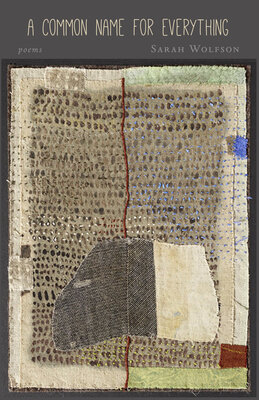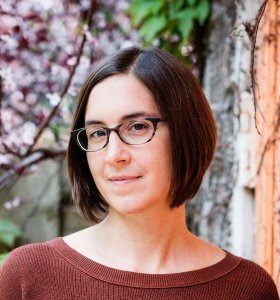Happy National Poetry Month! To kick off the month, we are excited to share an interview with Montreal poet Sarah Wolfson. Her book, A Common Name for Everything, was published by Green Writers Press in September of 2019. We hope you enjoy the interview as much as we enjoyed Sarah’s book!

Literary North: Could you tell us a little about your writing process? What are some different ways that you approach writing a new poem?
Sarah Wolfson: I think of my process as looking outward to look inward. But I could also say listening outward to look inward, because often my poems are sparked by the sound of something I hear or read. I believe we should be continually poised for the noticing, so I try to exist in a state of meditative expectancy, to borrow Carolyn Forché’s term, a state of being primed to notice whatever might present itself. And then, in the writing of a poem, I let my intuition guide me through what this noticing tells me about myself or about our collective selves.
LN: Describe the process of gathering poems for A Common Name for Everything. Did the organization of the book change as you worked on it?
SW: The organization of the book changed several times, partly because the poems were written over a long time period and different themes emerged as the collection grew and changed. Reorganizations took into account various themes that were emerging, and my excellent editors at Green Writers Press helped me see how the section titles could bring a stronger coherence to the book.
LN: The subject of many of your poems is language and what we call the things in our world. Can you describe your feelings about the process and the power of naming things?
SW: What interests me is how we often experience the world before we have names for its matter—but also how we sometimes experience the world through its names. Spagnum. Mullosk. Even though these things don’t exist in front of me in daily life, the songs of their names do. Naming is something we try to get exactly right—think of science with all of its taxonomies—but ultimately the thing and its name may inform each other in completely surprising ways—or not all. So, while naming is important, it’s always somehow erratic—and therefore full of potential for astonishment.
LN: Many of your poems are about childbirth and motherhood. Are there any poets, writers, or artists that address motherhood in ways that you find interesting, challenging or exciting?
SW: Alicia Jo Rabins’ book of poems Fruit Geode immediately comes to mind. It’s visceral and deeply honest. In Rabins’ poems the physical messiness and emotional ecstasy of pregnancy and childbirth coexist so naturally. Her poems are themselves geode-like: small and packed with sharp and startling crystals. I couldn’t put it down. I also recently enjoyed Day Counter, by Sara Mumolo, which is a sort of poetic daybook of the early years of parenting. Where Rabins is ecstatic, Mumolo is droll. And I just finished reading Camille Dungy’s memoir, Guidebook to Relative Strangers, which explores mothering, nature, race, and community in profoundly moving ways.
LN: We're curious about the mammoth who appears in "The Mammoth" and then again in "An Unfunded Study of Milking and the Moon," both poems related to birth. Can you tell us about the connection between mothering and mammoths?
SW: I’ve always been interested in “creature-ness.” It’s an impulse that predates this book. And in the book, you see creatures of all kinds: sheep, waxwings, ants, tree crabs, red-winged black birds, mollusks, moose. But I think the mammoth, in particular, recurs because of its earthiness and weight, both physically and as a vehicle for imaginative power. There’s something about the way the strange and the mundane overlap in its body that distills my experience of motherhood.
LN: Are there any books on your radar that you'd like to share with our readers?
SW: I can’t stop recommending Amy Leach’s Things That Are, a book of lyric essays—or maybe prose poems—on natural themes. It transcends genre and is sparklingly strange and wonderful. Her essays have titles like “When Trees Dream of Being Trees” and “Please Do Not Yell at the Sea Cucumber.” They are an absolute consideration of the here and now. I’m also looking forward to reading two newish books from the Canadian poetry scene: Billy-Ray Belcourt’s NDN Coping Mechanisms and Karen Solie’s The Caiplie Caves.

Sarah Wolfson is the author of the poetry collection A Common Name for Everything (Green Writers Press, 2019). Her poems have appeared in Canadian and American journals including AGNI, The Fiddlehead, Michigan Quarterly Review, and TriQuarterly. She holds an MFA from the University of Michigan. Originally from Vermont, she now lives in Montreal, where she teaches writing at McGill University.